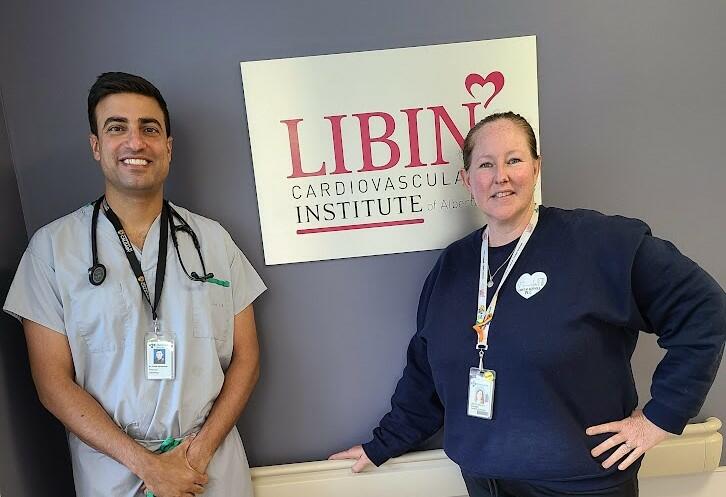June 23, 2023
Cardiac Neuromuscular Clinic fills care gap
Heart disease is a common problem for individuals born with neuromuscular disorders, especially those with muscular dystrophies. Muscular dystrophies first impact the skeletal muscles, but as patients age, their heart muscle and respiratory system is affected. In fact, the most common cause of death in these individuals is problems with their heart.
A new resource is available for adults living with these conditions. Calgary’s Cardiac Neuromuscular Clinic is the only clinic in Southern Alberta that specializes in monitoring and managing cardiac complications common to people living with neuromuscular disorders as they age.
The clinic, located at Peter Lougheed Centre, provides medical and psychological support for patients and their families. The team is made up of dedicated nurses, physicians, administrative support staff, and other providers, such as a social worker, dietitian and nurse clinician. They also collaborate with numerous other programs around the city to ensure patients, who often have complex care needs, get the help they need for the best quality of life possible.
Led by Dr Omid Kiamanesh, MD, the clinic, which officially opened April 1, 2023, already serves about 250 individuals ages 18-80 with a variety of genetic conditions and varying degrees of severity – from those who require oxygen to breath and who are confined to a wheelchair to those who outwardly seem unaffected.
Andreas Dauter, 24, is a patient at the clinic. He suffers from X-linked dilated cardiomyopathy, a genetic condition that mainly impacts the heart muscles and can lead to sudden cardiac arrest. It took the lives of his great-grandfather and his great-grandfather’s brother, who died at ages 24 and 18.
Dauter, a PhD student in Medical Sciences at the Cumming School of Medicine, began his journey to diagnosis at age 14 after several fainting episodes during his elementary and middle school years. Despite the faints seeming relatively benign, Dauter’s family and pediatrician decided to look deeper.
Heart tests revealed the more serious condition, which is often missed until the patient experiences cardiac arrest.
Although fortunate to have received the diagnosis, knowing took a toll on Dauter’s mental health, who feared for his future. The transition from pediatric care was quite difficult because of the rarity of his condition and the need for highly specialized care made it difficult to find the right care team to partner with.
“My condition in particular puts me in an interesting position,” he says. “It’s a neuromuscular problem, and that comes with a unique set of needs. I went to several talented physicians, but it was quite clear that they weren’t quite the right fit for me.”
Fortunately, Calgary’s Cardiac Neuromuscular Clinic team has proven to be the perfect fit.
“My concerns vanished when I met Dr. Kiamanesh,” says Dauter. “Having this clinic that is so obviously focused on these conditions has eased my fears. I used to expect my life to be short, but with the knowledge I have gained and the care I am receiving, now for the first time in my life I can see myself living into my 50s, 60s and even being able to experience retirement. I can’t tell you how good it feels to have faith in my future. That has made a huge difference in my life.”
Kiamanesh, a cardiologist with advanced training in heart failure, cardiomyopathies and genetic diseases of the heart muscle, said being part of the clinic’s team is satisfying.
“We are so proud of this clinic,” says Kiamanesh. “Many of our patients are fairly young people who require complex care. “Their quality of life can be quite affected by their disorder, which was a compelling reason to get involved. Being part of their care team is immediately fulfilling.”
Glenda Durupt, the manager of Cardiac Sciences at the PLC, says the need for specialized treatment of this demographic is growing.
“As people with these conditions age, they often experience symptoms related to their heart,” says Durupt. “This comprehensive care offered by our clinic will help increase the length and quality of life of these patients. We are so pleased to be able to provide the care these patients need and deserve.”
Because these conditions are genetic, many of the clinic’s patients are from family groups – sometimes multiple generations of the same family receive care at the Cardiac Neuromuscular Clinic, where they are both treated and monitored closely with the goal of postponing the development of heart failure symptoms, such as fatigue, difficulty breathing and irregular or rapid heartbeat.
The clinic is also participating in research. All patients are given the opportunity to take part and about 90 per cent of them choose to do so. The team has already set up collaborations locally and provincially to study the unique population.
“Our goal is to understand disease mechanisms and disease phenotypes,” says Kiamanesh, a clinician-researcher, who explains many of the conditions impacting these individuals are rare and affect patients differently.
“It’s exciting because there are lots of new therapies for these patients. We are on the cusp of precision medicine breakthroughs.”
Another aspect of the clinic is its education component.
The team regularly hosts clinical fellows, like Dr. Kaitlyn McGrath, MD, to give them exposure to a unique population.
“This is such a different aspect of care,” says McGrath, who volunteers her time to be in the clinic. “As cardiology fellows, we often see patients with acute conditions, such as those who have suffered a heart attack. In this clinic, you see families and there is a long-term component to their care.”
The longitudinal component of patient care is something Kiamanesh relishes.
“It’s a privilege to work alongside these patients and their families,” says Kiamanesh. “On difficult days, you grieve with them, and, on better days, you celebrate their successes with them.”

Dr. Kiamanesh and Glenda Durupt are part of the Cardiac Neuromuscular Clinic
Photo Supplied
